| baikin | germ, bacteria | |
| baku |  |
tapir |
| bara | 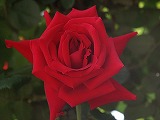 |
rose |
| batta |  |
grasshopper There are many kinds of grasshopper in Japan. In some rural area, people eat inago (Oxya japonica) a family of grasshoppers. If you would like to taste it, try to find at the Nittai-ji temple fair or other traditional temple fairs. Usually they are cooked with soy sauce, sugar and sake, called tsukudani. |
| bekko-ame-zaiku | 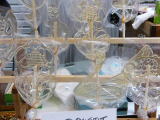 |
<= Click for a larger pic. Bekko means tortoiseshell, ame means candy and zaiku (saiku) means work. The color of the candy is transparent brown and looks a like tortoiseshell. A craftsman make a candy into various kind of animals, plants, etc. |
| bento-bako | 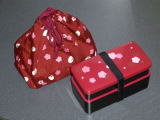 |
lunch box |
| biiru |  |
beer |
| bimbo-yusuri | bimbo means poverty, and yusuri (yusuru) means to shake. fidgetting and tapping one's foot |
|
| biwa | A musical instrument. The origin is in Persia or Arabia. |
|
| binzuru-san |  |
Binzuru (Pindola-bhâradvâja) was one of Buddha's disciples.
He was reprimanded by Buddha because he flirted the magical powers, and he was not allowed to get in Nirvana. Then he had been tried to save all living things. In Japan, the image of Binzuru are usually set out of the inner temple. People pat a part of his body where they have trouble by disease and worship to be recovered from it. |
| bonenkai | 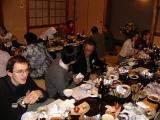 |
year-end party eat, dink, and chat a lot in order to forget the unpleasant things happened in a year and look ahead to the coming new year with a fresh spirit |
| bon-odori | 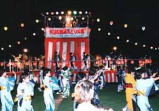 |
bon festival dances folk dances performed by local people during the bon period (August 13,14 and 15, or Mid July) to welcome back, console and the send off the ancestors spirits. |
| bonote | 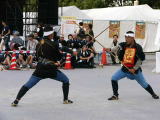 |
One of the Japan's traditional choreographed matial artistic folk entertainment. |
| bonsai |  |
a miniature potted tree or plant. |
| bosai-zukin | disaster prevention coif | |
| boso-zoku | motocycle gang | |
| botan | 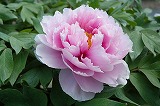 |
peony "Tate-ba shakuyaku, suware-ba botan, aruku sugata wa yuri no hana" This saying shows a beautiful woman standing like a shakuyaku (Paeonia lactiflora), sitting like a peony, and walking like a lily. |
| budo |  |
grapes |
| Buildings in Nagoya | here | |
| buri | 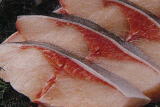 |
yellowtail. very popular fish in Japan. Buri is called shusse-uo (shusse means making a success of life and uo means fish). It's name is changed depending on the maturity of the fish and region. In Toky area: wakashi (until 1year, approximately 20cm)=> inada (40cm)=>warasa (60cm)=> buri (more than 90-100cm) In Osaka area: tsubasu =>hamachi =>mejiro => buri Buri caught in winter is called Kamburi and it more fatty and tasty. Buri-no-teriyaki is very tasty : )) |
| bussoku-seki |